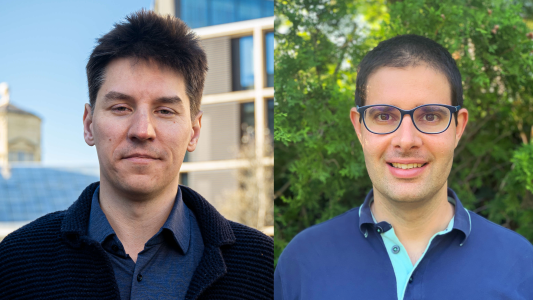Two Oxford Mathematicians are among four University of Oxford researchers who have been awarded European Research Council (ERC) Consolidator Grants, part of the EU’s Horizon Europe programme. These grants, totalling €678 million this year, aim to support outstanding scientists and scholars as they establish their independent research teams and develop their most promising scientific ideas.
ERC Consolidator Grants are highly competitive; this year 328 proposals were selected from 2313 applications, a success rate of 14.2%. Each of the Oxford recipients will receive up to €2 million over five years.
Dawid Kielak works in Geometric Group Theory, an area on the intersection of Algebra, Geometry, and Topology. He is particularly interested in the notion of “fibring”, the concept that a complex space may be understood as a simpler, lower dimensional structure changing over time. An example of this is space-time: a four-dimensional universe that can be viewed as a three-dimensional space evolving in time.
‘It turns out that the symmetries of the “universe” we are studying can reveal a lot about potential fibrings’ Dawid says. ‘I am looking for situations where these symmetries provide a complete picture as to whether fibring is possible. Using this grant, I aim to demonstrate that “negatively curved universes” (hyperbolic manifolds) with an odd number of dimensions always admit fibring, if small adjustments are made. This property is already known to hold for three-dimensional manifolds, and I will investigate how it extends to higher dimensions.
Mark Mezei's research focuses on the behaviour of interacting particles in the quantum world, which has applications ranging from early quantum computers to understanding black holes. Recent breakthroughs have enabled scientists to better control experimental quantum systems and produce new solvable models to study chaotic systems with many particles. Professor Mezei aims to uncover which insights from these studies are unique to specific systems and which apply universally across a wide variety of physical scenarios.
‘My approach uses a mathematical framework called Effective Field Theory, which can explain universal patterns in systems as varied as large networks, turbulent fluids, and nuclear interactions’ says Mark. ‘The goal is to adapt this powerful tool to study the chaotic behaviour of quantum systems with large numbers of particles. Besides enabling us to better understand these systems, this could ultimately provide predictions for quantum computing beyond the microwave range, and even new technologies in telecommunications, medicine, and remote sensing.’
Further information about the 2024 recipients of ERC Consolidator Grants can be found on the ERC website. You can read about all five University of Oxford researchers here.


